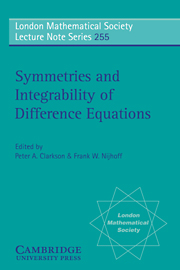Book contents
- Frontmatter
- Contents
- Preface
- List of Participants
- 1 Partial Difference Equations
- 2 Integrable Mappings
- 3 Discrete Geometry
- Discrete conformal maps and surfaces
- The Bäcklund transformation for discrete isothermic surfaces
- Integrable discrete geometry with ruler and compass
- Self-dual Einstein spaces and a discrete Tzitzeica equation, a permutability theorem link
- 4 Asymptotic Analysis
- 5 Discrete Painlevé Equations
- 6 Symmetries of Difference Equations
- 7 Numerical Methods and Miscellaneous
- 8 Cellular Automata
- 9 q-Special Functions and q-Difference Equations
- 10 Quantum Aspects and Yang-Baxter Equations
Self-dual Einstein spaces and a discrete Tzitzeica equation, a permutability theorem link
Published online by Cambridge University Press: 04 August 2010
- Frontmatter
- Contents
- Preface
- List of Participants
- 1 Partial Difference Equations
- 2 Integrable Mappings
- 3 Discrete Geometry
- Discrete conformal maps and surfaces
- The Bäcklund transformation for discrete isothermic surfaces
- Integrable discrete geometry with ruler and compass
- Self-dual Einstein spaces and a discrete Tzitzeica equation, a permutability theorem link
- 4 Asymptotic Analysis
- 5 Discrete Painlevé Equations
- 6 Symmetries of Difference Equations
- 7 Numerical Methods and Miscellaneous
- 8 Cellular Automata
- 9 q-Special Functions and q-Difference Equations
- 10 Quantum Aspects and Yang-Baxter Equations
Summary
Abstract
The generation of integrable (differential-)difference equations by means of Bäcklund transformations and associated permutability theorems has become a standard technique in soliton theory. Here, it is shown that a permutability theorem for an integrable discrete version of the classical Tzitzeica equation leads, in the natural continuum limit, to a novel fully symmetric form of the equation governing self-dual Einstein spaces in four dimensions. As a by-product of this construction, the associated linear representation is found which turns out to be the Lax pair for the self-dual Yang-Mills equations with four translational symmetries and the gauge group of volume preserving diffeomorphisms.
Introduction
The generation of integrable differential-difference and fully discrete equations has become a well-developed branch of soliton theory. Typically, these (differential-)difference equations translate to integrable continuous counterparts by taking appropriate continuum limits. The limiting processes involved are usually quite subtle, with continuous variables entering via a multiple scales process (see for a recent review).
There exists, however, a distinct method of constructing integrable discrete systems which reduce to continuous ones by means of a natural limiting procedure in which the discrete independent variables may be regarded as truly discretized versions of the continuous variables. This technique has its origin in work by Levi and Benguria and has been refined and generalized by several authors. The main idea is to reinterpret Backlund transformations and associated nonlinear superposition principles as integrable differential-difference and pure difference versions of their continuous counterparts respectively.
- Type
- Chapter
- Information
- Symmetries and Integrability of Difference Equations , pp. 137 - 148Publisher: Cambridge University PressPrint publication year: 1999
- 9
- Cited by

